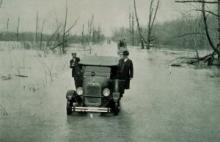Shabbat Shalom and welcome to Judeo Talk. The Torah portion for this week is the story of Noah and the Great Flood. This is obviously one of the most allegory-heavy sections of the Tanakh and as such it serves a strong foundation for an effectively endless series of lessons.
The story of Noah, provided one's interpretation of it is not literal, is the Jewish entry in what may just be the most common mythological theme in human history: the deluge. There are practically as many flood epics as there are civilizations on record. Given the prevalence of Abrahamic monotheism in the world, the story of Noah is one of the most widely known, but it is certainly not the only one. The Babylonian epic of Gilgamesh is another popular flood story and anyone familiar with ancient Chinese myth will recall the deluge that introduced a legendary leader named Da Yu into both historical and folklore texts. Ultimately, the importance of flood stories is how a given culture uses such a universal disaster to teach a lesson.
The epic of Gilgamesh, for instance, doesn't aspire to the lofty, world-consuming flood of the Noah story. Rather, it is a more local disaster that text uses to posit Gilgamesh as a prudent, intelligent and all-around good man. He builds his own ark of sorts to protect his goods and his family, then when the waters recede he returns to the simple joys of his life. It is a moral tale to be sure, but it is a smaller, more human story.
Compare Gilgamesh to Noah, whose trial is nothing less than the end of the world. Noah is just one of many early biblical stories of "The Last Good Man". Like Seth, Lot and especially Abraham, Noah bears the responsibility of the world's future. The moral core of the book of Genesis suggests that the wicked can't be relied upon to safeguard life, so the obligation falls on the good, even down to the very last of the good.
Jewish stories often aspire to these incredible stakes. From Adam and Eve to the very last moments of the Tanakh, the future of righteousness and sometimes the very world itself hangs in the balance. This constant focus on the fate of all things instills Jewish philosophy with aims toward complete and total morality. It is not good enough for Noah, the last good man, to just be righteous in his own corner of the world. He has to take care of life itself.
For modern Jews, this means that we grow up with stories designed to instill us with a sense of global responsibility. Every moral decision is a decision for all of life. If Noah is the last man, then we are, in the spiritual sense, his descendants. We live our lives with the memory of the deluge from our storytelling tradition, a sense that there may come a time when we as individuals are asked to bear the obligation of goodness. While we probably won't ever have to save the world in the literal sense, we are all likely to stand alone on the righteous side of a moral decision.
